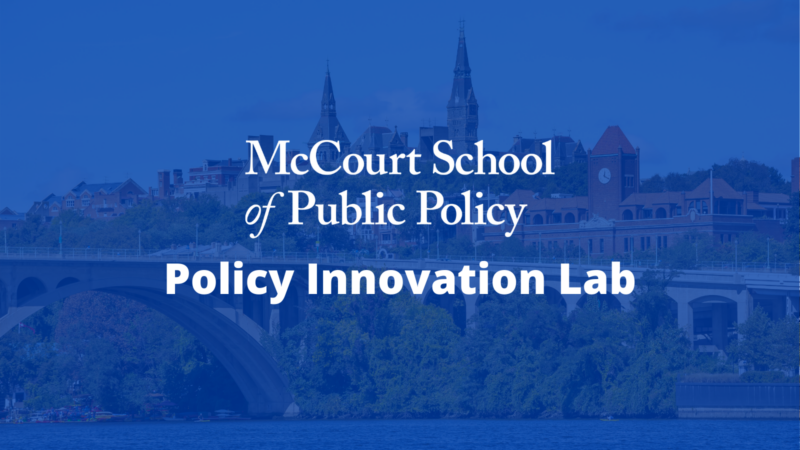This year, as the COVID-19 pandemic intensified many existing inequities both locally and globally, it illuminated the Lab’s ongoing efforts to best support and advance the critical work of its community partners. The Lab recognizes that more than ever, systemic, innovative, and transformative responses are required to tackle and dismantle longstanding and profound racial, health, wealth, and other inequities exacerbated by the destructive path of the virus. Every person and organization has a responsibility to look deeply and critically at history, systems, and policies — particularly structural racism — that perpetuate deep-rooted inequities and figure out a path for moving forward in ways that inspire and bring about radical change.

Title: Policy Innovation Lab Yearly Update
“The Lab is a prototype of how public policy students can become engaged with multiple stakeholders to help create change, using a unique set of tools that foster innovation and inclusion.”
Margaret O’Bryon, Assistant Research Professor & Executive Director Policy Innovation Lab
This academic year, the Policy Innovation Lab teams researched and collaborated with partners on human-centered solutions to address systemic inequity and support vulnerable communities disproportionately impacted by the ongoing pandemic. Lab members also participated in trainings, including implicit bias and human-centered design thinking and engaged in conversations with residents, activists, community leaders and others engaged in critical urban policy work in the city.
Learn more about the Lab’s projects below:
LOCAL ECONOMIES TEAM
- Team Lead: Devin Edwards (MPP’20)
- Team Members: Lukas Pisel (MPP’20), Gabrielle Crossnoe (MPP’21), Michelle Harati (MPP’21), Ravneet Kaur (MPP’21)
The Local Economies team began a new multi-year project in partnership with the DC Appleseed Center for Law and Justice focused on prioritizing racial equity in workforce development programs and District policies. First, the team developed a comprehensive understanding and measurable definition of racial equity to apply throughout the project to ensure accountability. Throughout the summer and fall, the team will implement an in-depth qualitative analysis of the District’s workforce development programs by conducting one-on-one and peer group interviews with program participants. Additionally, DC Appleseed aims to periodically issue workforce development progress reports to share updates with the public.
EQUITABLE DEVELOPMENT TEAM
- Team Lead: Nicholas Stable (MPP’21)
- Team Members: Joanna Shell (MPP’20), Daniel Lee (MPP’21), Mackenzi Loy (MPP’21)
A few years ago, the Lab embarked on a partnership with the Urban Institute to advance equitable development east of the Anacostia River. As the project progressed into the 2019-2020 school year, the equitable development team spent its time researching and meeting with various stakeholders to gain a deeper understanding of existing DC planning policies affecting the community and the development landscape in Wards 7 and 8. At the end of 2019, the team delivered a final report.
In spring, the team developed an issue brief on equitable development in the recovery from COVID-19 combining the knowledge gained from the fall project and information gathered from Lab partners in DC that work with the communities disproportionately impacted by COVID-19.
AFFORDABILITY COVENANTS TEAM
- Team Lead: Arturo Villegas Lima (MPP’20)
- Team Members: Paul Nicholas Pacheco (MPP’20), Marin Gilot (MPP’21), Roxanne Oroxom (MPP’21), Madeline Stern (MPP’21), Gary Zottoli (MPP’21)
In September 2019, the team began conversations with several partners interested in working with the Policy Innovation Lab to elevate residents’ voices affected most by policies. The team ultimately decided to pursue a project researching affordability covenants for DC Councilman Robert White’s office. The team examined the existing affordability covenants in DC and other cities and gathered qualitative data on the underlying problems. Based on the findings, the team drafted a memo for the Councilman’s office recommending the implementation of policies designed to improve transparency and data management of affordability covenants used across the city. The team aims to work with the Councilman’s office to write legislation reflecting the recommendations.
ANACOSTIA PARK AND COMMUNITY COLLABORATIVE TEAM (APACC)
- Team Lead: Andrew Debraggio (MPP’20) and Steven Swann (MPP’20)
- Team Members: Shrihari Ramachandra (MPP’21), Laura Storrs (MPP’21)
In June 2019, the team designed and executed a listening session exploring ways to advance equitable communities east of the Anacostia River with the Anacostia Park and Community Collaborative (APACC). During the school year, the team continued its work to develop a policy agenda and Anacostia River corridor vision that reflects the community’s needs and aspirations. In collaboration with APACC, the team is developing a logic model based on a theory of change that places iterative community engagement at the center of APACC’s work to ensure its work focuses on the people in the Anacostia Park community. In the 2020-2021 academic year, the team is adding a specific anti-racism training to the curriculum and examining the Lab’s role in advancing racial equity and dismantling racism.
To learn more about the Policy Innovation Lab’s work, visit the website and read the annual report.
